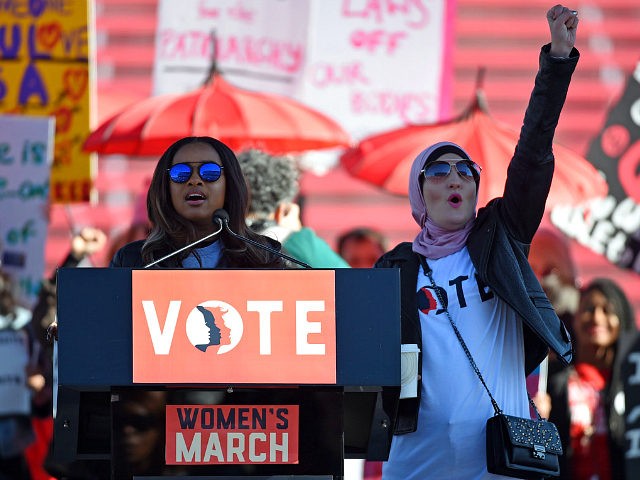The Women’s March is planning to take to the streets again on January 19 in Washington, DC, to protest Donald Trump’s presidency, but groups affiliated with the left-wing organization are dropping out in the wake of charges that its leaders embrace anti-Semitism, including associating with outspoken anti-Semite Nation of Islam leader Louis Farrakhan.
The Chicago Tribune reported:
As controversy swells around national Women’s March organizers, the local group has decided not to host a march in January — an event that for the past two years drew hundreds of thousands of supporters to Grant Park in concert with similar marches across the globe.
In a February speech, Farrakhan praised Women’s March Inc. co-President Tamika Mallory and in the same address declared “the powerful Jews are my enemy.” The national organization denounced Farrakhan’s comments in March, but many criticized leaders for not speaking up sooner. Mallory has also praised Farrakhan on social media.
The Tribune said the group cited the high cost and number of volunteers as reasons for the cancelation, but the Chicago Women’s March rebuked anti-semitism and other claims of discrimination, including against LGBT individuals, after Teresa Shook, one of the founders of the national organization, condemned national leaders and called for them to step down.
Those leaders include Palestinian American and anti-Israel Linda Sarsour, Tamika Mallory, Carmen Perez, and Bob Bland.
Breitbart News reported on Shook’s statement regarding the national Women’s March:
Bob Bland, Tamika Mallory, Linda Sarsour and Carmen Perez of Women’s March, Inc. have steered the Movement away from its true course. I have waited, hoping they would right the ship. But they have not. In opposition to our Unity Principles, they have allowed anti-Semitism, anti- LBGTQIA sentiment and hateful, racist rhetoric to become a part of the platform by their refusal to separate themselves from groups that espouse these racist, hateful beliefs.
I call for the current co-chairs to step down and to let others lead who can restore faith in the Movement and its original intent. I stand in Solidarity with all the Sister March Organizations, to bring the Movement back to its authentic purpose.
The Chicago Women’s March posted the cancelation of the march in that city on Facebook in a statement that said, in part:
Our March to the Polls on 10.13.18 drew an estimated 100,000 people to Grant Park for an empowering day of unity.
Because WMC put so much time, money, energy and effort into our October event, we will NOT be marching again in January. However, we are planning exciting WMC anniversary action on Saturday, January 19, 2019. Please stay tuned for more details.
The statement added that the organization would be working to influence Chicago’s municipal elections in February.
The Tribune reported that Chicago is not the only city where local organizations are pulling away from the national group.
“The president of a Women’s March chapter in Washington state earlier this month announced the group would be dissolving in protest,” the Tribune reported. “The Rhode Island chapter in May said it was separating from the national organization.”
In a March, the national organization issued a statement defending its efforts.
Women’s March is committed to fighting all forms of oppression as outlined in our Unity Principles. We will not tolerate anti-Semitism, racism, misogyny, homophobia, and transphobia and we condemn these expressions of hatred in all forms.
Women’s March is an intersectional movement made up of organizers with different backgrounds, who work in different communities. Within the Women’s March movement, we are very conscious of the conversations that must be had across the intersections of race, religion and gender. We love and value our sister and co-President Tamika Mallory, who has played a key role in shaping these conversations. Neither we nor she shy away from the fact that intersectional movement building is difficult and often painful.
The Tribune spoke to Dana R. Fisher, a professor of sociology at the University of Maryland who studies protests and activism. She predicted January 2019 will not be the same as earlier marches.
“I think it would be a heavy lift without the controversy, and with the controversy, it just gives another reason not to march,” Fisher said.
Follow Penny Starr on Twitter

COMMENTS
Please let us know if you're having issues with commenting.